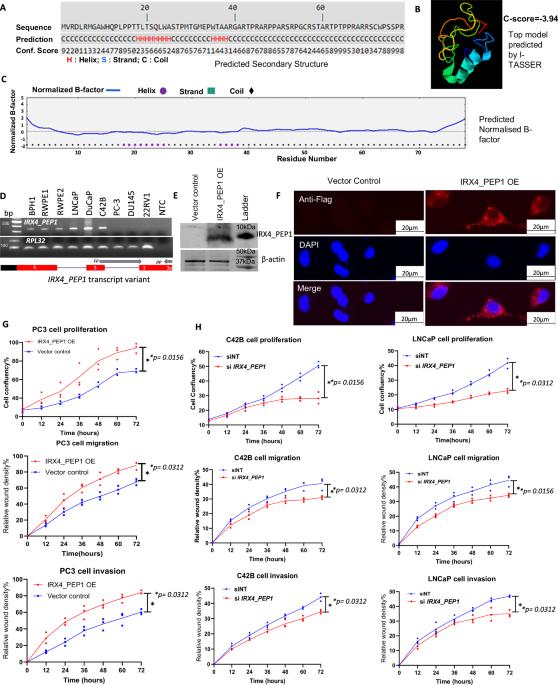Iroquois homeobox 4 (IRX4) derived micropeptide promotes prostate cancer progression and chemoresistance through Wnt signalling dysregulation
IF 5.4
Q1 MEDICINE, RESEARCH & EXPERIMENTAL
引用次数: 0
Abstract
Prostate cancer (PCa) is a commonly diagnosed cancer. Genome-wide association studies have implicated Iroquois homeobox 4 (IRX4) in PCa susceptibility, yet its functional roles remain unclear. We discovered a 78-amino acid micropeptide (miPEP, IRX4_PEP1), encoded from the alternative start site within the IRX4 gene. The miPEPs, encoded through short open reading frames (sORFs) have emerged as regulators of diverse biological processes. However, the significance of miPEPs in prostate tumorigenesis and therapy response remains unexplored to date. Here, we demonstrated the unique role of IRX4_PEP1 in PCa. The role of IRX4_PEP1 was evaluated in PCa in vitro via functional assays and comprehensive pathway analysis. The interacting partners of IRX4_PEP1 were identified using an immunoprecipitation assay, and the impact of IRX4_PEP1 on PCa stem cells was assessed through a stem cell enrichment assay. Additionally, the expression of IRX4_PEP1 was evaluated in PCa patient samples for its potential diagnostic and prognostic significance. Here we show IRX4_PEP1 promotes PCa cell proliferation, migration, and invasion by interacting with heterogeneous nuclear ribonucleoprotein K (HNRPK). Notably, IRX4_PEP1 dysregulates Wnt signalling by interacting with Catenin beta 1 (β catenin; CTNB1), elevating PCa stemness markers, and fostering docetaxel resistance. Clinically, IRX4_PEP1 expression is elevated in PCa tissues and correlates positively with disease aggressiveness. CTNNB1, HNRNPK levels, and ssGSEA enrichment score of WNT/CTNB1 signalling correlate positively with IRX4_PEP1 in PCa tissues. These findings highlight IRX4_PEP1 role in PCa stemness and chemoresistance, suggesting it as a therapeutic target and potential diagnostic marker. Prostate cancer (PCa) is a common cancer in men. Our early research identified a small protein, IRX4_PEP1, derived from the Iroquois homeobox 4 (IRX4) gene. The function of this protein was characterised through several assays using PCa cells and PCa stem cells. Our results show that IRX4_PEP1 helps PCa cells to grow and resist treatment by interacting with CTNB1 and HNRPK proteins, affecting the Wnt signalling pathway. Moreover, IRX4_PEP1 increased PCa stem cells and stem cell markers associated with PCa. IRX4_PEP1 levels are higher in PCa tissues and relate to more aggressive disease. This makes IRX4_PEP1 a potential target for PCa treatments and a marker for diagnosis. Fernando et al. investigate a micropeptide encoded in the Iroquois homeobox 4 (IRX4) gene for expression patterns and signalling effects. Their findings suggest it could serve as a therapeutic target and potential diagnostic marker in prostate cancer.

Iroquois homeobox 4(IRX4)衍生的微肽通过 Wnt 信号失调促进前列腺癌的进展和化疗抗性。
背景:前列腺癌(PCa)是一种常见的癌症。全基因组关联研究表明,易洛魁同源染色体 4(IRX4)与 PCa 易感性有关,但其功能作用仍不清楚。我们发现了一种 78 氨基酸的微肽(miPEP,IRX4_PEP1),由 IRX4 基因内的替代起始位点编码。通过短开放阅读框(sORF)编码的 miPEPs 已成为多种生物过程的调控因子。然而,迄今为止,miPEPs 在前列腺肿瘤发生和治疗反应中的意义仍未得到探索。在这里,我们证明了 IRX4_PEP1 在 PCa 中的独特作用:方法:通过功能测试和综合通路分析评估了IRX4_PEP1在体外PCa中的作用。通过免疫沉淀试验确定了IRX4_PEP1的相互作用伙伴,并通过干细胞富集试验评估了IRX4_PEP1对PCa干细胞的影响。此外,还评估了IRX4_PEP1在PCa患者样本中的表达,以确定其潜在的诊断和预后意义:结果:我们在这里发现,IRX4_PEP1 通过与异质核糖核蛋白 K(HNRPK)相互作用,促进了 PCa 细胞的增殖、迁移和侵袭。值得注意的是,IRX4_PEP1通过与卡替宁β1(β catenin;CTNB1)相互作用,使Wnt信号失调,提高了PCa干性标志物,并增强了多西他赛耐药性。在临床上,IRX4_PEP1 在 PCa 组织中的表达升高,并与疾病的侵袭性呈正相关。PCa组织中的CTNNB1、HNRNPK水平以及WNT/CTNB1信号的ssGSEA富集得分与IRX4_PEP1呈正相关:这些发现强调了IRX4_PEP1在PCa干性和化疗耐药性中的作用,表明它是一个治疗靶点和潜在的诊断标志物。
本文章由计算机程序翻译,如有差异,请以英文原文为准。
求助全文
约1分钟内获得全文
求助全文

 求助内容:
求助内容: 应助结果提醒方式:
应助结果提醒方式:


